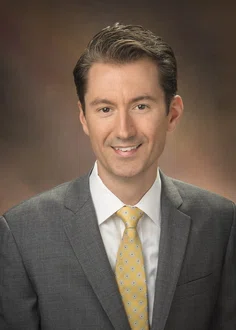


result
AAAAI Member’s Research: First Molecular Identity of Food Allergen Presentation and Immune Recognition in EoE
AAAAI Member’s Research: First Molecular Identity of Food Allergen Presentation and Immune Recognition in EoE

David A. Hill, MD, PhD, FAAAAI
David A. Hill, MD, PhD, FAAAAI, knew at the age of eight that he wanted to be a pediatrician. By high school, he realized he could also make an impact by performing research. “While attending Carnegie Mellon University, I went to my mentor to ask if I could pursue an MD and a PhD, since I really wanted to do both. When he told me there were integrated programs designed just for that, I was thrilled! Now I have my dream job working as a pediatrician and doing research that addresses important questions in the allergy field that will hopefully lead to actionable insights.”
One of the important questions in the field that Dr. Hill has been investigating is how the immune system recognizes food antigens in eosinophilic esophagitis (EoE). It’s the subject of his paper published in the April 2025 issue of The Journal of Allergy and Clinical Immunology (JACI).
This line of research started in 2020, when he received the HOPE AAAAI/APFED award. “The grant allowed me to develop the first data sets around this research idea. Those data were the basis for the rest of the studies we performed. This work couldn’t have been done without the HOPE award. I’m very grateful they took a chance on this ambitious and ultimately fruitful idea,” Dr. Hill said.
It was the large knowledge gap in this area that led him to pursue research in immune recognition of EoE. “We had decades of research that EoE was a food allergy, and translational evidence that there are food specific T-cells in EoE, but no one had proven that T-cells recognize food in EoE,” Dr. Hill explained. “I knew I needed to address this knowledge gap to improve diagnostics, screening approaches and therapeutics.”
Dr. Hill went on to receive a Faculty Development Award in 2023, which was based on a distinct but related area of study. “It turned out that some of the features we were studying in the Faculty Development Award were also found in the HOPE study,” Dr. Hill said. “I set out with two distinct lines of investigation that ended up being related.”
Dr. Hill is studying a unique interferon-signaling pathway in EoE for his Faculty Development Award project and detected evidence of interferon signaling in the T-cells he examined using the HOPE award. His paper in JACI is a combination of both those research projects, discussing the first molecular identity of food antigen presentation and immune recognition in EoE.
“JACI is the premier journal for our field, so it is always an honor to be published there,” Dr. Hill said. “I also believe JACI’s readership includes some of the best physicians and scientists in the field, who I hope will assess and utilize the research.”
Dr. Hill does plan to perform follow-up research based on the results published in JACI. “This is an important paper because it shows proof of concept and feasibility,” he said. “The research shows that there are food specific T-cells in children with EoE. Now we need to expand the study to more children and adult patients. Ultimately, I would like to study hundreds of subjects to identify relevant T-cells for each food. I have written an R01 to try and start that research process.”
This work could have considerable impact on the care of people with EoE. Dr. Hill highlighted three potential areas:
- Identifying the molecular signatures that recognize food allergens will facilitate the development of novel diagnostics and biomarkers for EoE.
- Research like this can also help with developing HLA-based screening algorithms akin to those that currently exist for celiac and other inflammatory diseases.
- This line of research is also the first step towards developing cell specific therapeutics that modulate the behavior of disease-causing cells.
“I could not have completed this research without the training that my mentors David Artis, Mitchell Lazar and Jonathan Spergel provided me. I am also indebted to my amazing research team and collaborators including Wayne Shreffler, Hakon Hakonarson and Karen Cerosaletti. I’m also incredibly grateful to the AAAAI and AAAAI Foundation for supporting this work,” Dr. Hill said.
If young researchers have one takeaway from his journey, Dr. Hill says he hopes it is to not be afraid of risk. “Risk is inherent to science. Without risk your likelihood of making transformative discoveries is much lower. Also, don’t be afraid to go where the science takes you. Branch out and meet talented people across disciplines who will help you to answer bigger questions. Finally, don’t give up – patients need your research!”




